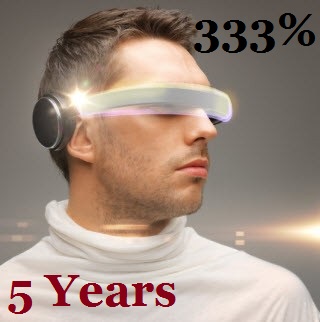The expanding use of both smart phones and smart glasses are predicted to expand the use of the tech.
According to a recent report released by Juniper Research, there are an estimated 60 million people worldwide who use augmented reality applications on a regular basis.
This report also stated that this figure should jump to 200 million by the year 2018.
It was also noted in the report that augmented reality has the opportunity to take off from its current focus in the gaming and navigation environments and will expand into much greater everyday use purposes. The publication stated that “Initial innovations will stem from games, such as Google Ingress, but the technology will expand to include lifestyle and fitness apps.” It also added that there is a chance for “paradigm shifting utilization of AR within social media, potentially breaking the digital-physical wall with potential future uses allowing a digital representation of a person to appear in the users surroundings.”
By the year 2018, games and location based augmented reality will represent under half of the tech’s usage.
 Juniper believes that by that time, augmented reality will have expanded greatly into areas such as healthcare and lifestyle. It could help with remote doctor visit experiences, as well as to help to enhance the remote shopping experience as well as that through social networks. It has also seen a potential future in enterprise, such as providing technical specs for aircraft mechanics and drawings to overlay on machinery for engineers to use for building new technologies.
Juniper believes that by that time, augmented reality will have expanded greatly into areas such as healthcare and lifestyle. It could help with remote doctor visit experiences, as well as to help to enhance the remote shopping experience as well as that through social networks. It has also seen a potential future in enterprise, such as providing technical specs for aircraft mechanics and drawings to overlay on machinery for engineers to use for building new technologies.
Some companies have already started to use augmented reality for this type of project, such as SpaceX and Elon Musk, which use AR tech for designing new components for rockets. That said, the majority of apps that use this technology, such as Layar, provide content overlaid on paper to make it “come to life” with such elements as added data and video. It was pointed out that most of them are ad funded. Juniper also pointed out that there are a few pay-per-download and some that are freemium.
Equally, Juniper feels that the augmented reality industry will only benefit from the increasing dominance of Android, as it will help to improve AR’s current situation which is seen as rather buggy and fragmented.

 According to the California Highway Patrol (CHP), it is not legal for a motorist to operate a motor vehicle while using a video monitor, TV, video screen, television receiver, or other means of displaying a television or video broadcast in a visual way, for a business or entertainment application, if it is visible to the driver, even if it is in the back seat, facing forward. This would imply that wearing these augmented reality gadgets could be defined as breaking the law as – depending on what is being displayed – it could be showing something of an entertainment or business purpose.
According to the California Highway Patrol (CHP), it is not legal for a motorist to operate a motor vehicle while using a video monitor, TV, video screen, television receiver, or other means of displaying a television or video broadcast in a visual way, for a business or entertainment application, if it is visible to the driver, even if it is in the back seat, facing forward. This would imply that wearing these augmented reality gadgets could be defined as breaking the law as – depending on what is being displayed – it could be showing something of an entertainment or business purpose.